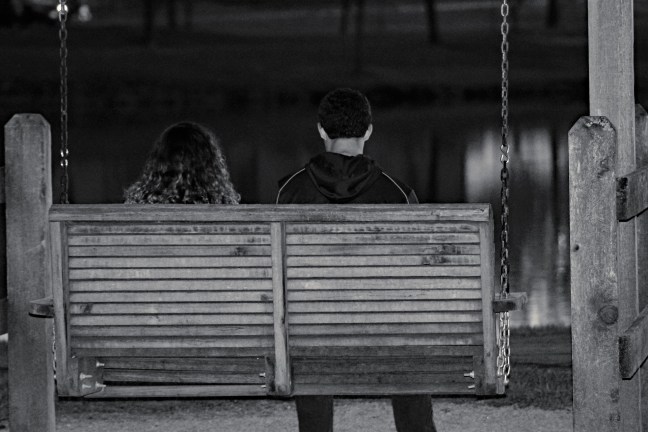When we feel it, it seems so clear – this must be love! Yet in hindsight, sometimes the glossy coating starts to chip away and we realize that those intense and very real feelings weren’t love, but actually something else.
Is it love? Or, is it…
Limerence
The year was 1991. Even though my history teacher was delivering important information for the upcoming exam, my mind was focused elsewhere. Or, actually I guess I could say elsewho. Because I was completely obsessed with the boy I had recently started dating. The thoughts and feelings were all-consuming, obsessive even. Based on intensity alone, I just knew that this had to something something special – true love. It was only once the relationship ended a couple months later (as high school romances often do), that I realized how little I actually knew this boy that I had professed to love. What I was actually in love with was the fantasy that I had created within my own mind.
Limerence is basically the rom-com of the romantic realm. It starts with some element of truth and then surrounds it with layer upon layer of sugary-sweet fantasy. It feels like love because of its overwhelming intensity, as our neurotransmitters are played like Chopin on the keys. Yet, because limerence is not strongly rooted in reality, it lacks the vulnerability, sacrifice and authenticity that characterizes mature love.
Chemistry (AKA Lust)

I think most of can relate to this experience. You meet someone. Maybe they’re conventially attractive, maybe not. It doesn’t matter. Because when their fingertips brush against you arm, sparks fly. Things are amazing for a time because everything is focused on the physical. And in that realm, you make the perfect pairing. But then something happens that feels like being on a train that has abruptly slammed to a halt. In communication outside of the bedroom, you realize that not only do you not really know this person, you may not even like them all that much.
Biology doesn’t care if we love someone; it simply needs for us to get it on to keep the species on. Lust can be quite powerful and can be a driving force in a relationship for quite some time. However, lust is at its most intense when the experience is new. And new can only last so long. Lust can be a precursor to love, as the relationship transitions and deepens, or it can simply be an enjoyable stopping point along the way.
Feeling Wanted
I was mere months out from being suddenly abandoned by my husband of sixteen years. My self-esteem was at rock bottom and the fear of being alone forever vibrated through me with the constant hum of a ceiling fan on a summer night. And then I was approached by a man at the gym. A good-looking man, who expressed interest in me. And, damn, did that feel good on that day. I went out with him, even though my still-shattered heart had absolutely no business dating. I got sucked in, too far and too fast, not because it was love, but because it made me feel like I was lovable.
We all want to feel wanted, chosen. And when we’re in particularly vulnerable spots in our lives, we can end up falling for people not because we want them, but because they want us. This is exactly why the advice is that you have to love yourself first before you can find love. Otherwise, you may find yourself committing to the first person who picks you.
Mirroring

I thought we had the perfect marriage. We never argued. We had the same likes and dislikes. And we even had similar views on pretty much everything.
Too bad none of that was real.
I wasn’t seeing him; I was seeing a reflection of myself. And it felt good. “He really gets me”, I thought, as his sentiments echoed my own. But that’s not love. After all, you cannot love something that you cannot fully see.
Sometimes mirroring is done by those who are afraid of being alone, as they morph into what we want them to be. Other times, mirroring is more nefarious when it is one of the tools used to lovebomb a partner or prospective partner.
Real love doesn’t ask for two people to blur into one; it allows – and even celebrates – the differences that each person brings to the union.
Relief From Discomfort
When is a sip of water most refreshing – when you’re sitting at your desk drinking water throughout the day or after two grueling hours spent mowing the lawn on a hot summer day? When do you think attraction is at its most powerful – when your life is full and happy or when you’re experiencing scarcity or hardship?
Sometimes, it is less about loving the person and more about loving some discomfort they have alleviated for us. Maybe great aunt Sally has finally stopped pestering you now that you’re in a relationship. Or, your financial worries have been replaced with nice dinners out. Your life is better, but it may be more about what the person brings with them and less about who the person is. A quick test to determine the difference – which thought causes you more distress? Losing them, but keeping everything else that has changed in your life once they entered or keeping them, but without the ancillary benefits?
When our lives are in a drought, any romance becomes the best thing on earth. It is only when our lives are already lush than we can truly discern what we truly love.
Flattery From Partner
“You are the best thing that has ever happened to me.”
“I’ve never met anyone like you before.”
“I’ve never felt this way with anyone else.”
In real love, each person helps the other grow and become better. Excess flattery is like a shortcut of this process. Instead of engaging in the messy and difficult worth of growth, it jumps straight to the “you’re the best thing ever!” Of course, that praise comes with a price. You must stay that way in order to keep those feelings flowing.
There is a difference between being adored and being loved. Although they both feel good to receive, only the latter allows you the freedom to be yourself and to grow.
Approval From Others
“I like her,” your mom says after meeting your new girlfriend, followed by a list of all your date’s desirable qualities. Immediately, your interest in your partner increases. After all, she got the mom stamp of approval, which is something you’ve sought yourself your whole life.
We care what others think about our romantic choices. We want validation for attracting and selecting a good mate. Sometimes, especially if we are insecure in ourselves, we can put too much emphasis on this external approval and believe that we love someone solely because the others in our life seem to love them.
Security

I received a letter from one of my students recently. In it, she detailed how my classroom always made her feel safe. And for most of us, when we think back to the most important people in our childhood, part of what made them so influential was their ability to make us feel protected. And when we’re young and vulnerable, protection is one of the most important signs of love.
Most of us struggle with feelings of uncertainty. We want to know how things are going to unfold. And relationships often bring with them some sense of security. After all, we are more accepting of risk when we have that safety net beneath us.
In a loving partnership, a sense of security is built over time by continually showing up for each other and working to solve problems as a team. The love comes first, and the sense of dependability comes after. If instead that security comes from one side or precedes the teamwork, it is easy to confuse that sense of safety with being loved.
Control
My friend came from an abusive household, where her alcoholic and controlling father ruled the roost. In her first serious relationship, she described her new fiancé as, “Wonderful. He cares so much for me that he won’t let me work. He just wants to take care of me.” Alarm bells went off in my head, but her childhood had taught her that control = love.
This can go the other way as well, as some people confuse a sense of possession as love. If the person is malleable and submissive, that must mean that they truly adore you, right?
The irony here is that for the deepest love, you have to learn to release all control.
Narrative Matching
“I’m going to be married by the time I’m 30,” you declared in your youth. So then, with the end of your 20s rapidly approaching, you convince yourself that you love this person so that your life will match the story you’ve been telling yourself.
This is basically like reading a book backwards – you are beginning with the conclusion of love at a certain time or in a certain way and then you’re working backwards to make it happen.
Sometimes this works. After all, look at arranged marriages where the betrothed find a loving and meaningful connection. But if the love cannot be created, there is a human tendency to allow confirmation bias to convince us that our conclusion is correct.
We push people away because we are afraid of letting them in and being hurt when they leave.
We grasp on to people that are not good for us because we are afraid of being alone and someone is better than no one.
Pushing and pulling are fear, not love.
Love is holding.
Loosely enough so that each person has the freedom to grow and change.
And firmly enough so that each person knows they are supported.
It is trusting the other person enough that they want to stay even if they have the ability to leave.
And trusting yourself that you will be okay if they do.





